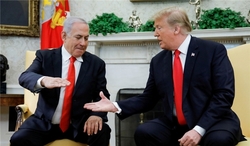 Washington has launched a push to promote “non-belligerence” pacts between Israel and Arab nations as a prelude to normalization of ties with the Tel Aviv regime.
Washington has launched a push to promote “non-belligerence” pacts between Israel and Arab nations as a prelude to normalization of ties with the Tel Aviv regime. RNA - Deputy national security adviser to the US president, Victoria Coates, proposed the initiative to ambassadors of the United Arab Emirates, Bahrain, Oman and Morocco in Washington, US news website Axios cited US, Israeli and Arab sources as saying on Tuesday.
During the talks, which took place last week, Coates announced Washington’s backing for “non-belligerence” pacts with Israel, asking the Arab representatives for their positions.
The ambassadors said they would declare their positions after reporting to their capitals, Axios said.
The pacts are regarded as “an interim step between the secret relations Israel has with those countries now and full diplomatic relations,” the report added.
On Monday and Tuesday, an intera-gency team headed by Coates also met with a delegation led by the Israeli Foreign Ministry regarding the agreements.
Axios said that the talks were in a preliminary stage.
Asked about the discussions, a senior Trump administration said that he could not comment on the “private diplomatic conversations” and had nothing to announce at the time.
Washington “would certainly welcome expanding relationships between our critical allies and partners in the Middle East,” he said.
Washington’s push for non-belligerence pacts with Israel is built on an initiative proposed by Israeli Foreign Minister Israel Katz, the report wrote.
The foreign minister was reported to have raised the matter in a meeting with Emirati Minister of State for Foreign Affairs Anwar Gargash and Omani Foreign Minister Yusuf bin Alawi in September.
The developments come as Israel and certain Persian Gulf countries have been gradually expanding public cooperation in the past year in what observers believe has been largely due to a shared interest in targeting Iran.
In October 2018, Israel’s culture and sports minister Miri Regev paid a historic visit to the Emirates. That same month, Israeli Prime Minister Benjamin Netanyahu became the first Israeli prime minister to visit Oman in more than 20 years.
Earlier this year, Katz shared a photograph with Bahraini Foreign Minister Khalid bin Ahmed Al Khalifah during an event in Washington, marking a rare public meeting with a high-raking Arab leader.
Numerous secret meeting have also been reported between Israeli and Persian Gulf state officials in recent months.
Arab leaders have generally sought to deny relations with Tel Aviv fearing the backlash of domestic public opinion which is usually heavily supportive of the Palestinian cause.
The push for increased cooperation between Arab states and Israel is, however, to be pursued "irrespective of what occurs with the Israeli-Palestinian conflict,” The Jerusalem Post reported last month.
Observers, nonetheless, have highlighted that the initiative faces major obstacles as Tel Aviv is mired in domestic political hurdles and has pushed aside any attempt at an Israeli-Palestinian peace process
“The fact that Israel has an interim government and might be headed for yet another election — and also the desire from the Arab states for progress on the Israeli-Palestinian peace process to precede closer relations — will make implementation very difficult,” Axios wrote.
847/940